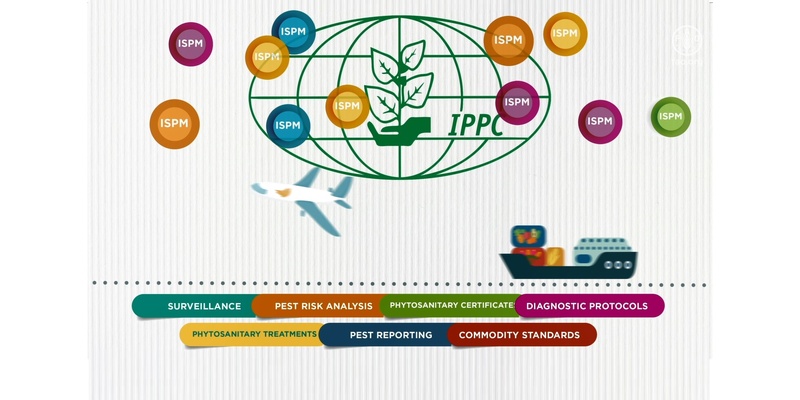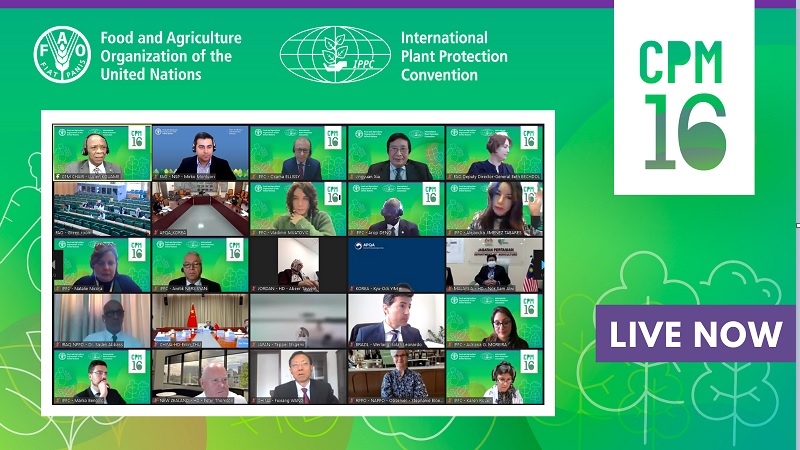CPM -16 adopts nine new plant health standards, to enhance plant health worldwide
Posted on Tue, 05 Apr 2022, 21:54

Rome, 05 April 2022. The Commission on Phytosanitary Measures adopted nine International Standards for Phytosanitary Measures (ISPMs) during its today's 16th session as presented by the IPPC Standard Setting Senior Officer Avetik Nersisyan. The IPPC is the only global-standard setting organization for plant health. Most crucially, National Plant Protection Organizations (NPPOs) base their phytosanitary systems and import requirements on adopted ISPMs, helping to regulate international trade in such a way as to keep it safe whilst mitigating phytosanitary risks.
“The international standards for phytosanitary measures play a crucial role in protecting sustainable agriculture and global food security, the environment, forests and biodiversity, as well as in facilitating safe trade and economic development." said Osama EL-LISSY, IPPC Secretary.
“Being an intergovernmental treaty devoted to protect global plant resources from the spread and introduction of pests, the IPPC represents a global and integrated effort of 184 contracting parties to harmonize phytosanitary measures, to ensure best practices in plant health and therefore facilitate safe trade” he added.
The ISPMs which have been adopted during CPM-16, will contribute more specifically to reducing the spread of pests (e.g., through audits and with the “over-arching” commodity standards), improving pest management (e.g., through harmonized phytosanitary treatments) and managing the pest risks associated with trade in plants and plant products. Whilst contributing to numerous UN FAO Sustainable Development Goals (SDGs), (namely SDGs 1, 2, 8, 12 and 17. Adopting these ISPMs will also contribute to key IPPC strategic objectives, most importantly by enhancing global food security and increasing sustainable agricultural productivity, protecting the environment from the impacts of plant pests and facilitating safe trade, development, and economic growth.
The CPM-16 adopted nine standards, including five phytosanitary treatments annexes to ISPM 28 (Phytosanitary treatments for regulated pests):
- ISPM 46 (Commodity-specific standards for phytosanitary measures)
- ISPM 47 (Audit in the phytosanitary context)
- Focused revision of ISPM 12 (Phytosanitary certificates) in relation to re-export and revoked the previously adopted version.
- 2019 and 2020 amendments to ISPM 5 (Glossary of phytosanitary terms) and revoked the previously adopted version.
- PT 40 (Irradiation treatment for Tortricidae on fruits)
- PT 41 (Cold treatment for Bactrocera zonata on Citrus sinensis)
- PT 42 (Irradiation treatment for Zeugodacus tau)
- PT 43 (Irradiation treatment for Sternochetus frigidus)
- PT 44 (Vapour heat–modified atmosphere treatment for Cydia pomonella and Grapholita molesta on Malus pumila and Prunus persica)
- Noted that the Standards Committee adopted on behalf of the CPM the following diagnostic protocols (DPs) as annexes to ISPM 27 (Diagnostic protocols for regulated pests):
- DP 30 (Striga spp.)
- DP 31 (‘Candidatus Liberibacter’ spp. on Citrus spp.)
"A huge effort from the entire international phytosanitary community that has been actively engaged in the standard setting process. Thus, Contracting Parties will continue the harmonized phytosanitary approach through the standards and therefore more tools to strengthen an international safe trade" said Ezequiel FERRO, Standards Committee Chairperson and Agricultural Engineer and Argentina officer lead for International Phytosanitary Affairs of the Argentina NPPO.
During CPM-16, the CPM Recommendation R-10 “Reduction of the incidence of contaminating pests associated with regulated and unregulated articles to protect plant resources and facilitate safe trade” was also adopted.
“Like many countries, Australia faces increased pest pressure from contaminating pests that are not linked to the commodity being imported. We welcome this CPM Recommendation which aims to reduce the incidence of contaminating pests on regulated and unregulated articles, such as sea containers and conveyances, also for the provision of safe aid. This recommendation is one more step towards an integrated solution and Australia is grateful to all contracting parties who have participated and contributed to its development” noted the Australian National Plant Protection Organization (NPPO), the contracting party that submitted the topic proposal.
To learn more about the benefits of the newly adopted ISPMs and phytosanitary treatments (PTs), please visit: https://www.ippc.int/en/core-activities/standards-setting/ispms/
To learn more about CPM Recommendations please visit: https://www.ippc.int/en/core-activities/governance/cpm/cpm-recommendations-1/cpm-recommendations/


